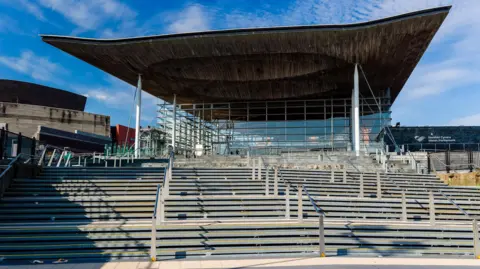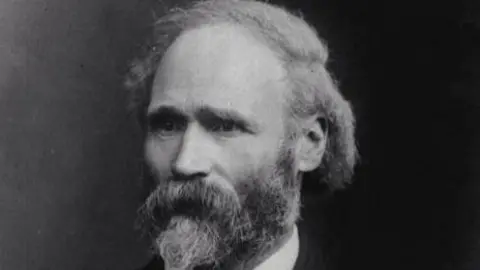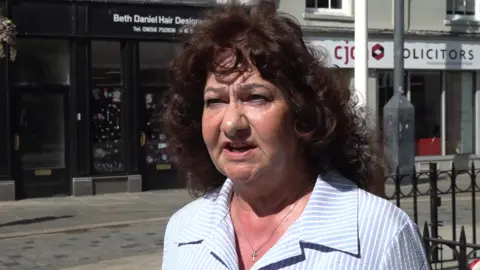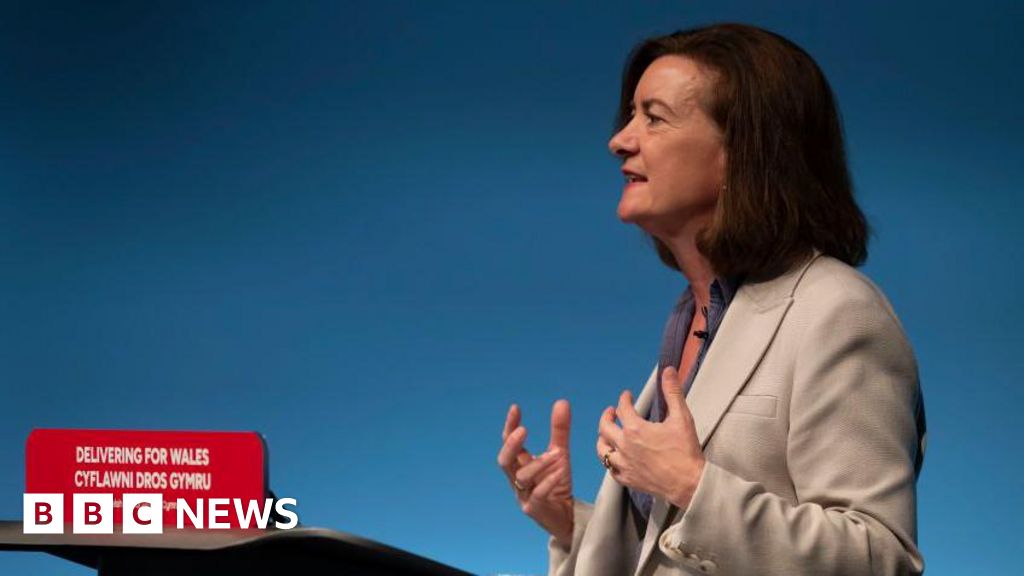Political reporter, BBC Wales News
 Getty Images
Getty ImagesYou have to go back more than 100 years, to before 1922, for an election where Labour was not dominating Welsh politics.
Rooted in the industrial heritage of the country which was once the home of the UK’s first Labour MP, Keir Hardie, the party has beat all others in Wales in every major Westminster election ever since.
Labour has always been the largest party in Cardiff Bay too, and has won every election for the Welsh Parliament.
But for the first time, the outlook for Welsh Labour at the next Senedd election on May 7 2026 is much less clear.
Led by Eluned Morgan, it faces a fight to hold on to the reigns of the Welsh government, and the sway it has held over Welsh politics.
Polls have shown Labour neck and neck with two parties – the pro-independence Plaid Cymru, and Nigel Farage’s Reform UK.
But a survey published this week suggested Plaid Cymru was pulling ahead, with Labour falling behind Farage.
Both Plaid and Reform are hoping they can leapfrog Labour and become the largest group in the Senedd, as are the Welsh Conservatives, who are polling behind the other three.
A new voting system means the next Senedd could be split between about four parties of a similar size, raising questions about exactly how the next Welsh government could be brought together.
A senior Tory has said a coalition in the next parliament is “nailed on”, and there is talk among some about whether parties would need to share the top job of first minister.
The Welsh Parliament, or Senedd Cymru, is what we now call the institution set up as the National Assembly in 1999.
Whoever can command control of the parliament forms the Welsh government – the ministers which run the services Westminster decided to hand over to Cardiff Bay, including the NHS.
While it has never won a majority, Labour has led every single government since 1999, with the assistance of Plaid and the Lib Dems.
 Getty Images
Getty ImagesThe potential for a shake-up in the Senedd is partly down to plans to expand the number of politicians there from 60 to 96 – the brainchild of former First Minister Mark Drakeford and former Plaid Cymru leader Adam Price.
As well as more politicians, the new parliament is likely to better reflect the proportion of votes won by each party – more so than the mixed system used up until now.
This is important when it is considered against polls that suggest Welsh voters are divided.
Two recent ones – from Survation and Beaufort Research – have put Labour ahead of Plaid and Reform but only just.
But a poll by ITV Wales and Cardiff University conducted in late April placed Plaid on 30%, with Reform behind on 25% and Labour on 18% – a historic low. The Conservatives were placed at 13%, the Lib Dems 7% and the Greens 5%.
All recent polling for Labour on Senedd voting intention is lower than how the party performed at the last general election, where it got 37% of the vote.
 PA Media
PA MediaCardiff University politics expert Prof Richard Wyn Jones said the previous mixed proportional and first-past-the-post system helped Labour win around 50% of the seats in Wales with “a third of the vote”.
He said elections in both Wales and Scotland next year will be the “most high-profile test for the Starmer administration”.
“It would be utterly seismic if they are not the largest party in Wales,” he told BBC Wales.
Prof Wyn Jones spoke before Tuesday’s poll was published – as did everyone else in this article. He said Labour’s chances of coming first should not be written off.
“But even if Labour is only barely ahead, that would be seismic because it would mean the Labour group in the Senedd is essentially not much bigger than the current Labour group in the Senedd, and the Senedd would be 36 seats bigger,” he said.
So, what could be behind it all?
The post-pandemic period has been tough for Welsh Labour – plunged into crisis over the donation of £200,000 from a man convicted of illegally dumping waste to its now-former leader, Vaughan Gething.
The row exposed splits within the Labour group of 30 MSs. Despite Welsh Labour having a landslide general election result, several Welsh ministers resigned to force Gething’s ouster, prompting the rise of Morgan as first minister.
Even before Drakeford decided to step down in late 2023, triggering the leadership contest that Gething won, Labour MSs had been arguing over transport policies, including the default 20mph speed limit, while the government has been struggling with long waits in the Welsh NHS.
Former Labour special advisor turned lobbyist Cathy Owens, of Cavendish Cymru, partly blamed the leadership crisis and factors at a UK level.
Or, as she puts it: “As soon as Labour won power at UK level… everybody realised that Keir Starmer wasn’t the most exciting leader we’ve had and then Labour had to make lots of difficult decisions.”
‘We were lecturing over 20mph’
NHS waits and the controversial 20mph speed limit were always among the top three issues relayed on the doorstep at the general election, according to a well-connected Welsh Labour activist.
They said a mix of Welsh and UK issues were at play, but argued that the Welsh government “got complacent”.
The activist blamed the “way” the 20mph speed limit was delivered – “it told voters we weren’t listening to them and we were essentially lecturing them”.
“I agree with the desired outcomes of the policy, but you can’t treat voters like that,” they said.
Alun Davies, Labour Blaenau Gwent MS, acknowledged the public was “frustrated with politics” but said: “Labour remains the party that probably most people in Wales feel represents their own values.”
The politician, who is involved in the production of the party’s manifesto, said: “Eluned has got the power to transform Welsh Labour’s fortunes during an election campaign.
“She is very straight-talking – what you see is what you get.”
Cathy Owens said the current first minister needed two things to get to 30% of the vote or more, “one of which is to reduce waiting times”.
For the second thing, Ms Owens said Morgan needed help from her party colleagues in the UK government – “some funding, or some extra investment” over and above what is automatically provided through the existing Barnett formula system, which is largely based on population.
“Now, that is proving more of a sticky wicket,” she said. “There has been no evidence of a win so far on that”.
The relationship between Welsh and Westminster Labour has become a big part of the story of Morgan’s time as Welsh Labour leader.
She has been increasingly keen to distance herself from Sir Kier Starmer – on Tuesday she gave a speech where she was willing to call out his government, should it take decisions that “harm” Welsh communities.
 Getty Images
Getty Images‘The polls tell a good story’
One party hoping to benefit from the turn in Labour’s fortunes is Plaid Cymru.
The left-leaning party has long struggled to beat its strong showing in the first assembly election of 1999 when it won almost 29% of the vote, but the splintering of British politics has presented Plaid with an opportunity.
Party leader Rhun ap Iorwerth has been presenting himself as a first minister in waiting, while the party has published plans on health and the economy it said it would enact if it formed the next Welsh government.
Unlike their political cousins in Scotland, the SNP, Plaid has never won a Welsh election and came third last time round.
It took part in a short-lived coalition with Labour between 2007 and 2011, and helped Labour govern more recently in the form of the co-operation deal which ended in summer 2024.
“We’re not getting too carried away with the polls,” Plaid’s Senedd party chairman Llyr Gruffydd said. “But the polls do tell a good story for us.”
“We will clearly be highlighting the need for change. It’s a tired government.”
He said the party will face a challenge in helping “people realise that this is a different electoral system. Every single vote counts – there will not be a wasted vote”.
It was put to Gruffydd that it was difficult for Plaid to be seen as anti-establishment when it had been involved in helping Labour govern. “We won’t shy away from the fact that we’ve been punching above our weight… and still achieving elements of our manifesto,” he said. “Imagine what we could do if we were in government.”
‘There’s so much frustration’
One party hoping to make their big entrance into Welsh politics is Farage’s Reform UK.
The party has polled closely to Labour and Plaid Cymru and came second in 13 seats at the last general election. While it has five MPs in England, and some councillors in Wales, it has no-one at Senedd at present.
It is celebrating its recent English local election successes, where it made big gains, won control of 10 councils, two mayors and a by-election from Labour.
Pointing to who the party is in Wales is difficult – it is yet to decide who will stand for them at the next election, or who might act as a figurehead.
They are not starting from scratch – Farage’s previous party UKIP had a short-lived stint in the Senedd after it won seven AMs in 2017.
At least one of their former AMs is hoping to become a Reform MS – Caroline Jones. She is hoping to stand for Reform in the seat of Pen-y-bont Bro Morgannwg – which covers Bridgend and Vale of Glamorgan.
Opponents accuse Reform of simply being a protest party, something that would be denied by Jones. She told BBC Wales that another former UKIP Senedd politician, and one-time Tory MP and ex-Abolish the Assembly AM, Mark Reckless, was working with a team on policy for the Senedd.
“At the moment, there’s so much frustration among the public – we are offering something different.”

Jones added: “You have to have a party that’s representative of the people, as opposed to just representing their own interests.”
UKIP’s time in the Senedd was characterised by two changes in leadership, rows, and splits. At one point there were more UKIP AMs who had been leader than had not – including Jones herself.
“The Reform party is united,” she said. “There are hardly any arguments at all, and anything that people disagree on.”
Other parties may try to capitalise on Farage’s relationship with the controversial US president Donald Trump to galvanise opposition to Reform.
Jones said that was not a negative: “If we’ve got special links with America, then I think it’s to be capitalised on.”
Asked if she thought the party needed a Welsh figurehead, she said: “That’s above my pay grade.”
‘This is what we’re for’
The Conservatives have a relatively new leader in the Senedd – Darren Millar, who took over late last year after a row over the leadership of Andrew RT Davies.
Under Millar the party has tried to present itself as a serious alternative to Labour, with the Senedd leader keen to show he can be the next first minister and not simply an opposition force.
But the Tories are still in the shadow of a disastrous general election, where the party went from having won 14 seats in the 2019 vote to zero. Recently it has been polling in fourth place. It came second in the Senedd election in 2021.
Samuel Kurtz, chairman of the Tory group in the Senedd, said he was excited by the prospect of the election and the “opportunities of a different political landscape come 8 May 2026”.
The MS for Carmarthen West and South Pembrokeshire said: “We need to put forward a positive vision for what Wales could look like. We have had 25 years of the same party in charge, the same government, and a tried and tested method of pretty much trying the same thing.
“It’s saying, look, this is what we’re for. We’re for a stronger economy, we’re for the ability for families to have choice over certain things like education, we’re for agriculture, we’re for tourism.”
He added: “What we’ve really done with Darren is really hunker down as to what is our USP as Welsh Conservatives, what are we for… rather than just saying we are against the 20mph speed limit for example, or we’re against the tourism tax.”
Asked why he thought the Welsh Conservatives were struggling in polls, former Senedd Tory adviser Anthony Pickles said: “Because the national party is still so involved in trying to work out its future strategy, its very difficult for the Welsh Conservatives to be diverging, and creating their own brand proposition”.
 Getty Images
Getty ImagesSmaller parties are thought to be at a disadvantage in the new system – with experts suggesting parties need 13% to 15% to win seats.
That is not to say they won’t try – with the Greens among those who will be hoping to enter the Welsh Parliament for the first time.
The Liberal Democrats, who won one regional seat at the last Senedd election and one at the last general election, are hoping to win more.
Welsh Lib Dem leader Jane Dodds previously told the BBC: “We’ll have gold everywhere. Look at what we did in England [at the last general election].
“No-one thought we would win 72 seats. The results were coming in fast and furious that night and I reckon it is going to be like that next May as well.”
Who could work with who?
It is early days, but the prospect of the electorate being split four ways or more raises questions about how the next government could be formed.
Politicians can be reluctant to talk about the topic with 12 months to go, but for Labour, you would assume a deal with the Conservatives or Reform would be unthinkable. Ministers have instead worked with Plaid and the Lib Dems in the past.
Plaid have ruled out working with Reform, but not Labour or the Tories.
The Conservative’s Kurtz declined to talk about who the party might work with, but said the likelihood of a coalition is “nailed on – it’ll have to be a coalition. No one party will reach the threshold of governing on their own”.
Plaid’s Gruffydd said a rotating first ministership – similar to how the coalition running the Irish government has operated with rotating prime ministers – “could be on the agenda”.
“It depends on the arithmetic,” he said, suggesting it could be discussed if there are “two parties thoroughly at the same kind of level”.
But Ms Owens said if Labour held at 27% as in some recent polls, you are “more likely to have a Labour first minister”, with the party a few seats or more ahead of Plaid.
Prof Wyn Jones also argued the upheaval in geopolitics could play a role.
It could not be predicted, he argued, whether something happening worldwide could make people feel more positive about Labour.
The expert added: “This is such a hugely uncertain time that everything that we are saying needs to be caveated.”

